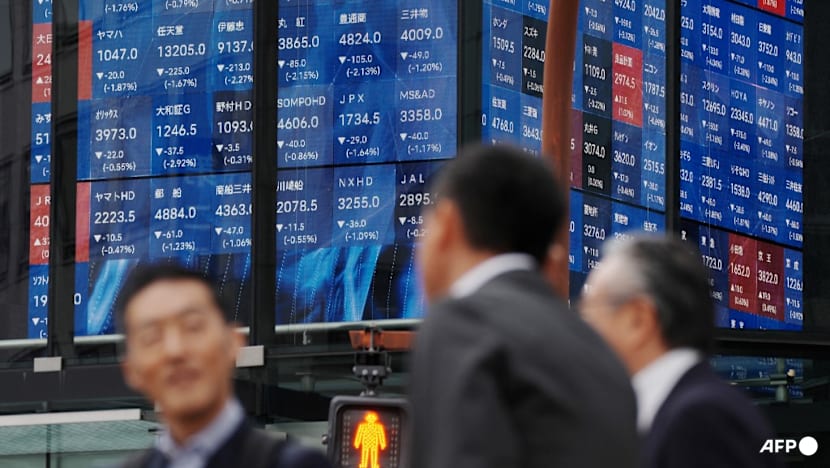Tech firms lead Asian stock rout as AI bubble fears linger
The downturn comes a day after a region-wide rally fuelled by an earnings report from AI bellwether Nvidia.

Pedestrians stand in front of an electronic quotation board displaying the Nikkei 225 stock prices on the Tokyo Stock Exchange during a morning session in Tokyo on Nov 18, 2025. (Photo: AFP/Kazuhiro Nogi)
HONG KONG: Tech firms led stock losses across Asian markets on Friday (Nov 21) as investors struggled to shake off fears about an AI bubble and after a sell-off on Wall Street sparked by jobs data dealt a further blow to hopes for a US interest rate cut.
A blockbuster earnings report from chip bellwether Nvidia on Wednesday seemed to settle nerves that vast investments in the artificial intelligence sector may have been overdone.
But the euphoria was short-lived as warnings grow that the tech-led rally across equities – which has seen several markets hit records and companies clock eye-watering capitalisations – may have run its course, and a correction could be in hand.
In unveiling Nvidia's forecast-topping report, boss Jensen Huang dismissed fears of a bubble that has caused global equities to wobble.
"From our vantage point, we see something very different," he said.
After his firm sparked an Asia rally on Thursday, Wall Street began on a strong note, but later went into sharp reverse, with selling compounded by worries over the US labour market.
Data showed that while more jobs were created in September, the unemployment rate crept higher.
The reading did little to alter investors' belief that the Federal Reserve will stand pat on borrowing costs when it meets next month, with officials more focused on stubbornly high inflation.
Expectations had already been dampened by recent comments from decision-makers, including boss Jerome Powell, that were on the hawkish side.
Tracking New York, Asian markets were a sea of red, with tech giants leading the way.
Seoul-listed Samsung Electronics sank nearly five per cent and rival SK hynix more than nine per cent - the firms are two of the world's leading memory chip makers.
Another chip titan, TSMC, tanked nearly four per cent in Taiwan, while Japan's SoftBank plunged more than 10 per cent in Tokyo.
That led broader markets lower.
Tokyo, Hong Kong and Shanghai each lost more than two per cent, while Taipei and Seoul were off more than three per cent. Sydney, Singapore, Wellington, Mumbai and Bangkok also saw steep losses.
London, Paris and Frankfurt all fell sharply at the open.
The rush from risk assets also saw bitcoin fall 5481656 for the first time since April, extending a sell-off suffered since its record high above US$126,200 last month.
"The price action across markets has been prolific, and we've seen some truly impressive reversals in risk assets," said Chris Weston at Pepperstone.
"Sentiment in so many markets remains highly challenged, and we've seen new evidence that managers are dumping their 2025 winners - raising expectations that the path of least resistance is for risk to trade lower in the near-term.
"The market seems far more sensitive and ready to de-risk on emerging news, almost seeking reasons to take positioning down when that news could easily be seen as a positive in a more bullish set-up."
The yen held earlier gains after Japanese Prime Minister Sanae Takaichi said her cabinet had approved a major US$135 billion stimulus package aimed at easing the pain of inflation on households and firms.
However, there are worries that the spending plan will add to Japan's already colossal debt and has pushed government bond yields to record highs, fanning concerns about the country's fiscal state.
The Japanese currency has fallen this week to its lowest level against the dollar since January, though it got a little support from data in the morning showing core inflation ticked up last month, giving the Bank of Japan some room to hike interest rates.
The yen's weakness has also raised the chances of authorities stepping in to support the unit, with Finance Minister Satsuki Katayama saying on Friday officials may intervene and take "appropriate action against disorderly (foreign exchange) moves".
Seoul-listed The Pinkfong Company, the creator of the Baby Shark YouTube video, tanked more than 11 per cent, with the value now below its IPO price, having made its market debut on Tuesday.
















